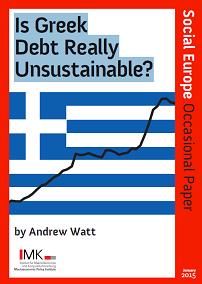Bertsou, E. & Brown, S. (2015) “Greek parliamentary elections: a final look at the parties and the polling“, LSE EUROPP, 23 Ιανουαρίου. On 25 January Greece will hold parliamentary elections. Ahead of the vote, Eri Bertsou and Stuart Brown take a final look at the election, providing an overview of the Greek party system, the latest polling, and some of the key contextual factors such as the impact of …Read More
Greece will remain in the euro for now
Odendahl, C. & Tilford, S. (2015) “Greece will remain in the euro for now“, Centre for European Reform, 16 Ιανουαρίου. Greece will hold a snap election on January 25th, after the country’s parliament failed to elect a new president with the necessary majority. Syriza, a left-wing party (or rather a coalition of parties) led by Alexis Tsipras, currently leads the polls. Given Syriza’s outspoken criticism of Greek economic and …Read More
Greek Elections, Democracy, Political Trilemma, and all that
Rodrik, D. (2015) “Greek Elections, Democracy, Political Trilemma, and all that“, Social Europe Journal, 08 Ιανουαρίου. Two-and-a-half years ago I wrote a short piece titled “The End of the World as We Know It” which began like this: “Consider the following scenario. After a victory by the left-wing Syriza party, Greece’s new government announces that it wants to renegotiate the terms of its agreement with the International Monetary Fund and the …Read More
We should be wary of removing the ECB from the troika to facilitate the use of outright monetary transactions
Otero Iglesias, Μ. (2015) “We should be wary of removing the ECB from the troika to facilitate the use of outright monetary transactions“, LSE EUROPP, 19 Ιανουαρίου. A key legal debate in the context of the Eurozone crisis is whether so called ‘Outright Monetary Transactions’(OMT), which would allow the European Central Bank (ECB) to buy unlimited numbers of government bonds in secondary markets, are compatible with European law. The …Read More
Why a Grexit is more costly for Germany than a default inside the euro area – Contrary to the IFO institute, we conclude that German losses on both official and private claims would be much higher if Greece exits the euro
Darvas, Z. & Hüttl, P. (2015) “Why a Grexit is more costly for Germany than a default inside the euro area – Contrary to the IFO institute, we conclude that German losses on both official and private claims would be much higher if Greece exits the euro“, Bruegel Institute, 16 Ιανουαρίου. A few days ago the influential IFO Institute published a short paper suggesting that a Greek default inside …Read More
Zoning out – Why leaving the euro would still be bad for both Greece and the currency area
Zoning out – Why leaving the euro would still be bad for both Greece and the currency area, The Economist, 17 Ιανουαρίου 2015. In 2012 Greece held two elections which might have led to its exit from the euro zone. In the event, that was avoided—a good thing since the costs of a “Grexit” would almost certainly have outweighed any gains, not only for Greece but for the entire …Read More
How to reduce the Greek debt burden?
Darvas, Z. & Hüttl, P. (2015) “How to reduce the Greek debt burden? – There are options to reduce the net present value of Greek public debt servicing costs by more than 15 percent of GDP without incurring losses on creditors, Bruegel Institute Analyses, 09 Ιανουαρίου. The Greek debt reduction issue has been put back on the table as the 25 January 2015 parliamentary snap elections are approaching. Already in …Read More
Is Greek Public Debt Unsustainable? It’s The (nominal growth rate of the) Economy, Stupid!
Watt, A. (2015) “Is Greek Public Debt Unsustainable? It’s The (nominal growth rate of the) Economy, Stupid!“, Social Europe Journal, Occasional Papers No. 6, Ιανουάριος. Greece will go to the polls on January 25th and everybody from German conservatives to Greek leftists seems to agree: Greek public debt is unsustainable. A haircut on investors and some form of partial default – more politely known as debt restructuring – is …Read More
Το Grexit έχει λιγότερους κινδύνους για την Ευρωζώνη
Εικονογράφηση: Τιτίνα Χαλματζή, Πηγή: Καθημερινή. Χαλιάσος, Μιχάλης (2015) “Το Grexit έχει λιγότερους κινδύνους για την Ευρωζώνη“, Εφημερίδα Καθημερινή, 11 Ιανουαρίου. «Εχουμε πάρει απλώς παυσίπονα για να αντιμετωπίσουμε τα συμπτώματα. Δεν έχουμε φτάσει στην αιτία του προβλήματος». Ετσι εξηγεί ο Μιχάλης Χαλιάσος, καθηγητής Οικονομικών στο Πανεπιστήμιο Goethe της Φρανκφούρτης, την αρνητική του απάντηση στο ερώτημα της «Κ» αν τα πλεονάσματα που έχει πετύχει η Ελλάδα, μετά έξι χρόνια ύφεσης και …Read More
Debt relief for Greece is necessary to avoid a crisis in the Eurozone
De Grauwe, Ρ. (2015) “Debt relief for Greece is necessary to avoid a crisis in the Eurozone“, LSE EUROPP, 12 Ιανουαρίου. On 25 January Greece will hold parliamentary elections. The elections have generated uncertainty in the Eurozone given the potential for the radical left party Syriza, which has called for a renegotiation of the country’s bailout conditions, to emerge as the largest party. Paul De Grauwe writes that even …Read More












